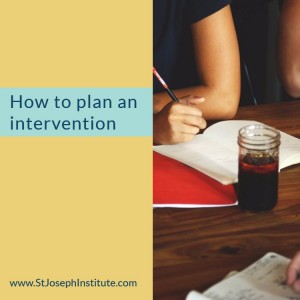How to Plan an Intervention
 An intervention is often the best way for someone suffering from drug or alcohol addiction to begin their path to recovery. People struggling with substance abuse are often suffering from denial about the extent of their problem, so hearing firsthand how their actions have affected their loved ones can serve as a wake-up call.
An intervention is often the best way for someone suffering from drug or alcohol addiction to begin their path to recovery. People struggling with substance abuse are often suffering from denial about the extent of their problem, so hearing firsthand how their actions have affected their loved ones can serve as a wake-up call.
This article outlines how to plan an intervention that will motivate your loved one to seek the help he or she needs.
Create an Intervention Team
An intervention planning team typically involves a small group of concerned family members and friends. However, you should not include anyone in the planning process who does not get along well with your loved one, is known for having an uncontrollable temper, or who is also suffering from an untreated substance abuse or mental health issue. It is vital to the success of the intervention that everyone be able to work together for the good of your loved one.
A healthcare professional such as a licensed counselor, social worker, psychiatrist, or psychologist may be necessary if your loved one has a history of mental illness and/or violent behavior. A professional can help you structure the intervention to reduce the risk of an aggressive outburst or self-harming behavior.
If your loved one’s faith is an important part of their life, including a pastor or religious leader may be appropriate.
Gather Information
Once you have assembled your intervention team, take time to discuss the specific addiction-related behaviors that are concerning you. This might include:
- Poor personal hygiene
- Changes in eating habits characterized by weight gain or weight loss
- Sleeping significantly more or less than usual
- Mood swings
- Trouble at work or school
- Difficulty remembering important details
- Lack of interest in hobbies or socializing
Ask each person on your intervention team to write down the specific behaviors they’ve witnessed, as well as how this has made them feel. You can use these notes to make sure everyone stays on track during the intervention meeting.
Research Treatment Options
After you present your loved one with an expression of your concerns, you’ll need to present your request for treatment. Research counseling options and inpatient rehabs in your area to determine what is appropriate for your loved one’s needs. Contact your insurance company to learn more about applicable health insurance benefits for substance abuse treatment.
Your goal is to be able to provide your loved one with a pre-arranged treatment plan that includes clear guidelines, steps, and goals for taking control of his or her addiction. Someone struggling with substance abuse may not be thinking clearly enough to make these decisions, so taking control of deciding what steps are necessary is a compassionate way to express your concern.
Decide on Consequences
The ideal outcome for an intervention is that your loved one will accept your request to get help. However, you must be prepared to be met with a denial of the problem and a refusal to listen to your request.
Each person on the intervention team should decide what the consequences will be for refusing treatment. This may include steps such as no longer being allowed to have unsupervised visits with children or grandchildren, cutting off social contact, or being asked to move out of the family home.
Hold the Intervention
It’s a good idea to schedule an intervention for the time of day when your loved one is least likely to be impaired by drugs or alcohol. In many cases, this means planning the meeting during the early morning hours.
When you hold your intervention, the meeting should be structured as follows:
- Everyone individually shares examples of behavior they’ve witnessed and how these actions have caused problems–expressing their concern without becoming judgmental or accusatory.
- The group presents the person with a prearranged treatment plan.
- Each person shares what consequences they’ve decided are appropriate for refusing to accept substance abuse treatment.
- The group asks for an immediate decision as to whether or not treatment will be accepted.
If the offer of help is accepted, you should be prepared to have the treatment begin immediately. If you’ll be using the services of an inpatient rehab facility, this means you should have a bag packed and be ready to transport your loved on to the facility when the intervention is over.
If treatment is refused, the members of the intervention team must be prepared to follow through with the consequences they’ve agreed to. This can be emotionally trying, but is a necessary part of the process.
By Dana Hinders
